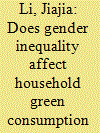| Srl | Item |
| 1 |
ID:
169887


|
|
|
|
|
| Summary/Abstract |
In this paper, we examine whether gender inequality affects a household's decision to adopt green consumption behaviour in China. Building upon the literature that claims women tend to be more environmentally friendly than men, we hypothesise that households in which women play a stronger role adopt greener consumption lifestyles. Based on a nationwide survey, our empirical results show that households in counties with greater gender inequality use less energy-efficient electric products and are less willing to save energy. The results are robust to a number of variations in our empirical models. Social and economic factors are included to further explore the mechanisms underlying households' decisions. Our findings provide new insights into green development from a micro-level, bottom-up perspective. They are relevant for policy makers because they indicate that promoting gender equality can have a favourable impact on green development.
|
|
|
|
|
|
|
|
|
|
|
|
|
|
|
|
| 2 |
ID:
150866


|
|
|
|
|
| Summary/Abstract |
Policy makers presently lack access to quantified estimates – and hence an explicit understanding – of energy consumption efficiency within households, creating a potential gap between true efficiency levels and the necessarily assumed efficiency levels that policy makers adopt in designing and implementing energy policy. This paper attempts to fill this information gap by empirically quantifying electricity consumption efficiency for a sample of more than 7,000 households. Adopting the recently introduced ‘frontier demand function’ due to Filippini and Hunt (2011) but extending it into the metafrontier context – to control for structural heterogeneity arising from location type – it is shown that consumption efficiency is little more than 60% on average. This implies huge potential for energy reduction via the expansion of schemes to promote energy efficiency. City households, which are the wealthiest in the sample, are shown to define the metafrontier demand function (and hence have the potential to be the most efficient households), but at the same time exhibit the largest inefficiencies. These facts together allow for a potential refinement on the household energy ladder concept, suggesting that wealth affords access to the best technologies thereby increasing potential energy efficiency (the ‘traditional view of the household energy ladder), but complementary to this these same households are most inefficient. This has implications for numerous areas of policy, including for example the design of energy assistance schemes, identification of energy education needs/priorities as well more refined setting of subsidies/tax-credit policies.
|
|
|
|
|
|
|
|
|
|
|
|
|
|
|
|